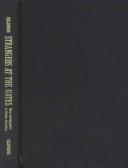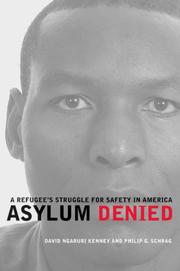| Listing 1 - 4 of 4 |
Sort by
|
Book
ISBN: 1789203341 Year: 2019 Publisher: New York ; Oxford : Berghahn,
Abstract | Keywords | Export | Availability | Bookmark
 Loading...
Loading...Choose an application
- Reference Manager
- EndNote
- RefWorks (Direct export to RefWorks)
“In this rich and resonant study, Joanna Newman recounts the little-known story of this Jewish exodus to the British West Indies.”—Times Higher Education In the years leading up to the Second World War, increasingly desperate European Jews looked to far-flung destinations such as Barbados, Trinidad, and Jamaica in search of refuge from the horrors of Hitler’s Europe. Nearly the New World tells the extraordinary story of Jewish refugees who overcame persecution and sought safety in the West Indies from the 1930s through the end of the war. At the same time, it gives an unsparing account of the xenophobia and bureaucratic infighting that nearly prevented their rescue—and that helped to seal the fate of countless other European Jews for whom escape was never an option. From the introduction: This book is called Nearly the New World because for most refugees who found sanctuary, it was nearly, but not quite, the New World that they had hoped for. The British West Indies were a way station, a temporary destination that allowed them entry when the United States, much of South and Central America, the United Kingdom and Palestine had all become closed. For a small number, it became their home. This is the first comprehensive study of modern Jewish emigration to the British West Indies. It reveals how the histories of the Caribbean, of refugees, and of the Holocaust connect through the potential and actual involvement of the British West Indies as a refuge during the 1930s and the Second World War.
Jews --- History --- 1930s. --- Jewish immigration. --- barbados. --- european jews. --- hitler. --- holocaust. --- immigrant stories. --- jamaica. --- jewish history. --- jewish refugees. --- memoirs. --- nazi germany. --- nazis. --- persecution. --- religious freedom. --- trinidad. --- west indies. --- ww ii history. --- xenophobia.
Book
ISBN: 082328736X 9780823287369 0823287378 9780823287376 Year: 2020 Publisher: New York Fordham University Press
Abstract | Keywords | Export | Availability | Bookmark
 Loading...
Loading...Choose an application
- Reference Manager
- EndNote
- RefWorks (Direct export to RefWorks)
A rare and evocative memoir of a respected constitutional scholar, dedicated public servant, political reformer, and facilitator of peace in the land of his ancestors. John D. Feerick's life has all the elements of a modern Horatio Alger story: the poor boy who achieves success by dint of his hard work. But Feerick brought other elements to that classic American success story: his deep religious faith, his integrity, and his paramount concern for social justice. In his memoir, The Further Shore, Feerick shares his inspiring story, from his humble beginnings: born to immigrant parents in the South Bronx, going on to practice law, participating in framing the U.S. Constitution's Twenty-Fifth Amendment, serving as dean of Fordham Law, and serving as President of the New York City Bar Association and chair of state commissions on government integrity. Beginning with Feerick's ancestry and early life experiences, including a detailed genealogical description of Feerick's Irish ancestors in County Mayo and his laborious quest to identify them and their relationships with one another, the book then presents an evocative survey of the now-vanished world of a working-class Irish Catholic neighborhood in the South Bronx. Feerick's account of how he financed his education from elementary school through law school is a moving tribute to the immigrant work ethic that he inherited from his parents and shared with many young Americans of his generation. The book then traces Feerick's career as a lawyer and how he gave up a lucrative partnership in a prestigious New York City law firm at an early age to accept the office of Dean of the Fordham School of Law at a fraction of his previous income because he felt it was time to give back something to the world. John Feerick has consistently shown his commitment to the law as a vocation as well as a profession by his efforts to protect the rights of the poor, to enable minorities to achieve their rightful places in American society, and to combat political corruption. That Further Shore is an inspiring memoir of how one humble and decent man helped to make America a more just and equitable society.
Lawyers --- Fordham University --- School of Law --- Presidents --- Feerick, John D. --- Children of immigrants --- Irish American lawyers --- Fordham University. --- Bronx. --- New York State Ethics Commissions. --- Presidential Inability. --- Skadden Arps. --- immigrant stories. --- sport arbitrations. --- the Electoral College System.

ISBN: 1282355899 9786612355899 0520927710 1597349224 9780520927711 9781597349222 0520230922 9780520230927 0520230930 9780520230934 9781282355897 6612355891 Year: 2001 Publisher: Berkeley University of California Press
Abstract | Keywords | Export | Availability | Bookmark
 Loading...
Loading...Choose an application
- Reference Manager
- EndNote
- RefWorks (Direct export to RefWorks)
Immigration is remaking the United States. In New York, Los Angeles, Miami, San Francisco, and Chicago, the multiethnic society of tomorrow is already in place. Yet today's urban centers appear unlikely to provide newcomers with the same opportunities their predecessors found at the turn of the last century. Using the latest sources of information, this hard-hitting volume of original essays looks at the nexus between urban realities and immigrant destinies in these American cities. Strangers at the Gates tells the real story of immigrants' prospects for success today and delineates the conditions that will hinder or aid the newest Americans in their quest to get ahead. This book stresses the crucial importance of understanding that immigration today is fundamentally urban and the equally important fact that immigrants are now flocking to places where low-skilled workers--regardless of ethnic background--are in particular trouble. These two themes are at the heart of this book, which also covers a range of provocative topics, often with surprising findings. Among the essayists, Nelson Lim enters the controversy over whether and how immigrants affect the employment prospects for African Americans; Mark Ellis investigates whether low immigrant wages depress other workers' salaries; William A.V. Clark contends that immigrants seem to be experiencing downward mobility; and Min Zhou asserts that trends among second-generation immigrants are decidedly more optimistic. These well-integrated and well-organized essays sit squarely at the intersection of sociology and economics, and along the way they point out both the strengths and the weaknesses of these two disciplines in understanding immigration. Providing a theoretically and empirically comprehensive overview of the economic fate of immigrants in major American cities, this book will make a major contribution to debates over immigration and the American future.
Cities and towns --- Foreign workers --- Immigrants --- Global cities --- Municipalities --- Towns --- Urban areas --- Urban systems --- Human settlements --- Sociology, Urban --- Economic conditions. --- Social conditions. --- african american. --- american history. --- city life. --- city living. --- essay anthology. --- essay collection. --- geography. --- immigrant history. --- immigrant stories. --- immigrants. --- immigration. --- indigenous people. --- minority groups. --- native born. --- poverty. --- race issues. --- race. --- racism. --- united states history. --- urban america. --- urban life. --- urban living. --- us history.

ISBN: 1281385557 9786611385552 0520934725 9780520934726 9780520255104 0520255100 9781281385550 661138555X Year: 2008 Publisher: Berkeley University of California Press
Abstract | Keywords | Export | Availability | Bookmark
 Loading...
Loading...Choose an application
- Reference Manager
- EndNote
- RefWorks (Direct export to RefWorks)
Asylum Denied is the gripping story of political refugee David Ngaruri Kenney's harrowing odyssey through the world of immigration processing in the United States. Kenney, while living in his native Kenya, led a boycott to protest his government's treatment of his fellow farmers. He was subsequently arrested and taken into the forest to be executed. This book, told by Kenney and his lawyer Philip G. Schrag from Kenney's own perspective, tells of his near-murder, imprisonment, and torture in Kenya; his remarkable escape to the United States; and the obstacle course of ordeals and proceedings he faced as U.S. government agencies sought to deport him to Kenya. A story of courage, love, perseverance, and legal strategy, Asylum Denied brings to life the human costs associated with our immigration laws and suggests reforms that are desperately needed to help other victims of human rights violations.
Immigrants --- Political refugees --- Civil rights --- Human rights --- Asylum seekers --- Refugees, Political --- Refugees --- Government policy --- Kenney, David Ngaruri, --- academic. --- african immigrant. --- asylum. --- attempted murder. --- courage. --- crime. --- deportation. --- escape. --- farmers. --- farming. --- hard times. --- homeland. --- human rights violations. --- human rights. --- immigrant stories. --- immigration law. --- immigration reform. --- immigration. --- imprisonment. --- kenya. --- kenyan immigrant. --- legal issues. --- legal strategy. --- life story. --- murder. --- native land. --- political refugee. --- political. --- prisoner. --- refugee story. --- scholarly. --- torture. --- true story. --- united states. --- us government.
| Listing 1 - 4 of 4 |
Sort by
|

 Search
Search Feedback
Feedback About UniCat
About UniCat  Help
Help News
News